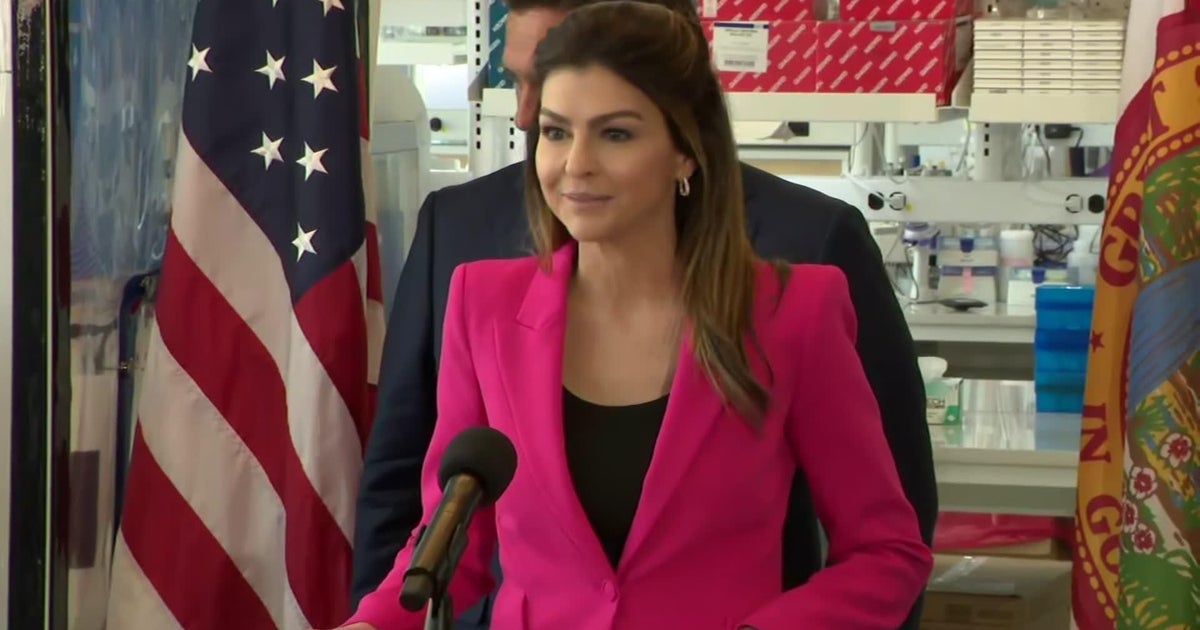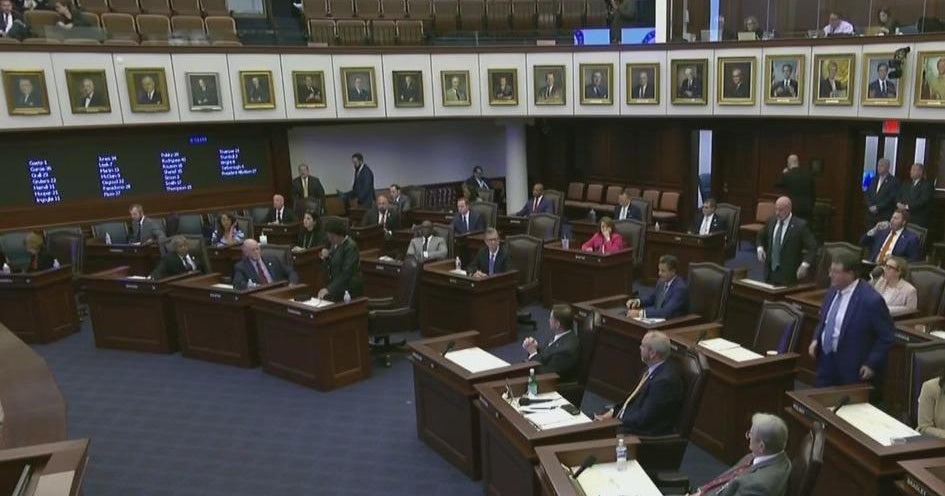DeSantis appointee to Disney board taught seminar, falsely claimed White people were slaves in America
ORLANDO - An appointee by Florida Gov. Ron DeSantis to an oversight board of Disney's special tax district taught a seminar in 2021 falsely claiming "Whites were also slaves in America," using discredited research to say there was an "Irish slave trade."
The comments were made by Ron Peri, one of five people DeSantis appointed earlier this year to oversee the Central Florida Tourism Oversight District to replace the old board after the company spoke out against what critics dubbed the "Don't Say Gay" law.
Peri, an Orlando-based pastor and CEO of a Christian ministry group called The Gathering, made the comments in an hourlong class for his group posted on YouTube about critical race theory called "Cunningly Devised Fables."
In other comments, Peri spread false claims that Irish slaves were forcibly bred with enslaved Africans. He also said a "significant" number of free Blacks in the antebellum era owned slaves, claims disputed by reputable historians who say the number was minimal. CNN archived Peri's comments from 2021, which he deleted from YouTube following his appointment to the Disney oversight board.
The oversight board, previously called the Reedy Creek Improvement District, governed Disney's sprawling 25,000 acre footprint around Orlando. Created in 1967, its duties include providing services like sewage, fire rescue and road maintenance and issuing debt for infrastructure projects supporting Disney's theme park empire.
"Slavery is a moral wrong wherever it exists or existed and is one of America's great historical wrongs," Peri told CNN in a statement. "Similarly, racism is likewise wrong. I countenance neither to any degree, so the criticism of the belief that thousands of people being held in slavery was significant and a terrible wrong is severely misplaced. Even one person in slavery is egregious and morally reprehensible, regardless of race."
Peri's 2021 comments came in the context of him pushing back on claims of "systemic racism" in the United States from past White ownership of slaves.
"Look at old newspapers, as old as you can find, and you'll find that Whites were also slaves in America," said Peri. "The Irish slave trade began when James II sold 30,000 Irish prisoners as slaves to the new world. His proclamation of 1625, which you can go back and see, required Irish political prisoners be sent overseas and sold to English settlers in the West Indies."
"By the mid-1600s the Irish were the main slaves sold to Antigua and Montserrat," Peri added. "From 1641 to 1652, over 500,000 Irish were killed by the English, and another 300,000 were sold as slaves."
"The settlers began to breed Irish women and girls with African men to produce slaves with a distinct complexion," Peri added.
Peri's claims are based on fabricated material that has circled the Internet over the last two decades and has been the subject of repeated debunkings from news organizations like the New York Times, Reuters, the Associated Press, Snopes, and frustrated historians - many of whom signed an open letter in 2016 disputing the claims.
Even the article Peri cited as evidence was updated before he used it in the seminar to note it contained a number of factual errors.
Historians have said that the research Peri cited is ahistorical and based on invented research: Whites were never considered slaves in America, legally or socially; 300,000 Irish were not sent as slaves to the Americas; English King James II - who Peri cited as issuing the proclamation in 1625 - was not born until 1633 and did not take the throne until 1685. Even then, no proclamations by King James II on Irish slaves exist. The Irish did not "breed" with African slaves, as Peri claimed.
Irish immigrants in North America and the Caribbean were never considered slaves but were indentured servants, said Matthew Reilly, a professor of anthropology at City College of New York.
Indentured servitude consisted of a fixed period of time, usually five to seven years, and was not inheritable. Whereas the race-based chattel form of slavery kept enslaved people as property for life and children would inherit their mother's status.
"The conditions may have been like that of slavery, but socio-legally, it was a very different form of unfreedom," said Reilly.
In another comment, Peri used data attributed to the 1830 census to say the numbers showed a "significant" and "large number" of free Blacks owned slaves. However, the 1830 census data cited by scholars show that out of 2,009,043 slaves in the United States, 3,776 free Blacks owned 12,907 slaves - 0.006%.
"The justification that they have for it is they claim that systemic racism emanates from White ownership of slaves," Peri said. "Therefore, all White wealth is based on the hard work and abuse of Black slaves and women. That's their justification. Well, the reality is all races owned slaves."
"A significant number of these free Blacks were the owners of slaves," Peri added.
Historians, like esteemed Harvard professor Henry Louis Gates, Jr., have noted that a large number of those Black slave owners "owned" their own family members to protect them - oftentimes by purchasing a family member. And that pointing to other races owning slaves is a way to minimize the brutal realities of slavery.
"The vast majority, the overwhelming majority - to the tune of millions of people who were brought from West and West Central Africa to the Americas - they were enslaved. Not people who were perpetrating slavery themselves," Jenny Shaw, a professor of history at the University of Alabama, told CNN. "There's a small number who did because they rose up in society and did what society was doing, which was enslaving people." And that some people of African descent enslaved people because they were family members bringing them into their households with the intent of freeing them.
Peri's unearthed comments come amidst the controversy over the Florida Board of Education's new standards for teaching Black history.
Disney and DeSantis
Peri's appointment to the Disney oversight board followed a clash between the company and DeSantis over a state law that would restrict certain classroom instruction about sexual orientation and gender identity. While Disney first declined to weigh in publicly on the legislative fight over what critics called the "Don't Say Gay" bill, then CEO Bob Chapek, under immense pressure from the company's employees, later changed directions, and shared his concerns with the legislation. Later, after it became law, the company in a statement said it would work to get it repealed.
However, Peri has also accused Disney in the past of adopting teachings of critical race theory in its company training. The comments touched on another top concern of DeSantis, who sought to ban employers from training workers about privilege and systemic racism when he signed the Stop Woke Act, parts of which were blocked by a federal judge from going into effect.
"We're seeing companies embracing CRT," Peri said in his Zoom. "I'm gonna just share two - Walt Disney you're quite familiar with. You know, down here in Orlando."
DeSantis has faced backlash in recent days over Florida's board of education approving controversial new standards for teaching Black history in the state, which includes teaching "how slaves developed skills which, in some instances, could be applied for their personal benefit." DeSantis has defended the state's curriculum.
Peri previously faced scrutiny after CNN's KFile uncovered that the Orlando pastor had suggested tap water turned people gay. Peri disputed that he made the remark during a May 1 Central Florida Tourism Oversight District board meeting, saying from the dais, "I never said that. I don't believe it, certainly."
The latest revelations about Peri's beliefs come as DeSantis' conflict with Disney is embroiled in dueling legal challenges. Peri is named as a defendant in a lawsuit filed by Disney, which alleges that the Florida governor has punished the company for exercising its First Amendment rights while describing his hand-picked board as a pawn in his "retribution campaign" against the entertainment giant.
In its complaint, filed in the United States Circuit Court for the Northern District of Florida, Disney alleged DeSantis picked board members who would "censor Disney's speech and discipline the Company" and that DeSantis' action against the company "threatens Disney's business operations, jeopardizes its economic future in the region, and violates its constitutional rights."
Peri, meanwhile, voted with the rest of the Central Florida Tourism Oversight District board to sue Disney in state court. In the past week, a Central Florida judge rejected Disney's request to dismiss the state lawsuit. In the federal case, lawyers for DeSantis have asked the court to delay a trial until after the presidential election while Disney attorneys suggested a timeline that would put the case before jurors next July.
The board installed by DeSantis has said much of its power was stripped by Disney in an agreement reached before the governor's appointees took over in February.
Since then, DeSantis and the board have focused on clawing back authority while threatening to develop the land around Disney - including by building a prison or a competing theme park next to Disney World.



